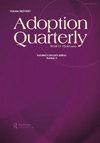Walking toward Adoption: A Critical Analysis of the PRI Program in Chile
IF 0.6
Q3 SOCIAL WORK
引用次数: 1
Abstract
AbstractEvidence shows that adoption is primarily a beneficial measure to ensure relational permanency for children who cannot return to their birth family. At the same time, it is one of the most radical experiences a child will ever have, requiring specialized preparation and support. This process is best supported by competent adoption professionals who understand the fundamental issues of adoption, such as loss, gain, identity, and significant relationships, and who promote the child’s agency and participation throughout the process. This paper provides a critical analysis of Chile’s PRI Program, created in 2008 to support and prepare children in residential and foster care for adoption. First, we present critical considerations and topics about the process of preparing children for adoption. Second, we explore PRI’s main objectives, components, and contributions. Finally, we discuss the challenges of this innovative program and present recommendations for its enhancement.Keywords: Adoptionchild-centered practicesidentitypreparationChile Disclosure statementNo potential conflict of interest was reported by the authors.Additional informationFundingThe authors disclosed receipt of the following financial support for the research, authorship, and publication of this article. This work was supported by the ANID/FONDECYT Project No.11200491走向采纳:对智利革命制度党计划的批判性分析
摘要有证据表明,收养主要是确保不能返回其出生家庭的儿童关系永久性的有益措施。与此同时,这也是孩子们一生中最激进的经历之一,需要专门的准备和支持。这一过程最好得到有能力的收养专业人员的支持,他们了解收养的基本问题,如失去、获得、身份和重要关系,并在整个过程中促进儿童的代理和参与。本文对智利的PRI项目进行了批判性分析,该项目创建于2008年,旨在为寄宿和寄养家庭的儿童提供收养支持和帮助。首先,我们提出了关于准备收养儿童过程的关键考虑因素和主题。其次,我们探讨PRI的主要目标、组成部分和贡献。最后,我们讨论了这一创新项目所面临的挑战,并提出了改进建议。关键词:收养以儿童为中心的实践身份准备智利披露声明作者未报告潜在的利益冲突。其他信息:资金:作者披露了其研究、创作和发表这篇文章的资金支持。本工作得到了ANID/FONDECYT项目(11200491)的支持
本文章由计算机程序翻译,如有差异,请以英文原文为准。
求助全文
约1分钟内获得全文
求助全文
来源期刊

Adoption Quarterly
SOCIAL WORK-
CiteScore
1.60
自引率
12.50%
发文量
3
期刊介绍:
Adoption Quarterly is an unparalleled forum for examining the issues of child care, of adoption as viewed from a lifespan perspective, and of the psychological and social meanings of the word "family." This international, multidisciplinary journal features conceptual and empirical work, commentaries, and book reviews from the fields of the social sciences, humanities, biological sciences, law, and social policy. In addition to examining ethical, biological, financial, social and psychological adoption issues, Adoption Quarterly addresses continuity in adoption issues that are important to both practitioners and researchers, such as: negotiation of birth and adoptive family contact.
 求助内容:
求助内容: 应助结果提醒方式:
应助结果提醒方式:


